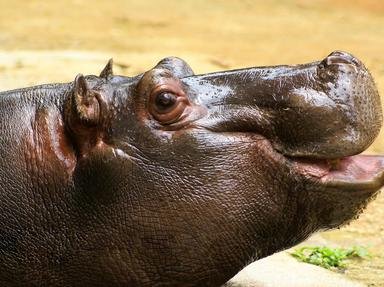Quiz Answer Key and Fun Facts
1. "When I was born, I looked just like any other fish, but after a while my left eye seemed to gain a mind of its own, moving to the right side of my head. It was so embarrassing and I sunk deeper and deeper until I reached the ocean floor. However, I soon learnt that I was quite normal, and that many fish down here had the same issue."
Which young fish is most likely to experience this?
2. "My five brothers and sisters and I were raised by our mother on the Isle of Scilly (though our species can be found in many places). She was always looking out for us, and if we were ever disturbed, she would lead us in a neat line to a new location, with me and my siblings holding onto the tail in front so that we stayed together."
Which animal has been observed exhibiting this intriguing behaviour?
3. "I'm often ridiculed for being "old fashioned" and "smelly". Apparently I'm old fashioned because I have two claws on each wing (some say that this links me to an old chap called Archaeopteryx). Oh, and I'm smelly because I only eat leaves; *sniff* I think they've got me there!"
Which young bird is being described here?
4. "When I was old enough, I was told about the birds and the bees. However, I was a bit different - my several hundred siblings and I hatched in the mouth of our father, where we had grown for ten days. Thank goodness for Dad's big gob."
Which type of animal is this most likely to apply to?
5. "I'm very close to my family. I have such fun playing tag, diving for rocks and sliding about in the snow on my belly. Even my parents join in - they say you're never too old to play games. Apparently these games are why we are so close to one another."
Which animal would be most likely to give this description of their early life?
6. "I am an only child. My brother, who was laid by our mother slightly before I was, was abandoned so that I could survive. I sometimes wish I did have a brother for the company, as my parents are noisy and aggressive, just like all adults of our species. The one saving grace is that, when I am older, I will have the same jazzy yellow crest on my forehead as my parents do."
Which of these animals is being described here?
7. "Though I was only given my mother's milk for four days (the shortest lactation period of any mammal, I'm told), I put on a huge amount of weight shortly after I was born. Apparently my mother's milk has the highest fat content of any mammal."
Which animal is this a typical experience for?
8. "I'll admit that I'm pretty selfish, but if I wasn't, I wouldn't be here. After hatching, I competed for food with my brother and sister so violently that they were both pushed (by me) from our nest and they starved to death. I can now keep all the food to myself, holding it in my large throat pouch."
Which animal is being described here?
9. "My mother was different to those hopping giants and gum-eating tree-climbers you hear about. I was born very underdeveloped, but instead of being sheltered in a pouch, my three siblings and I had to cling onto mother's exposed teats for dear life."
Which animal is this a typical experience for?
10. "When I asked about how I was born, I was told that it happened just off a very crowded beach. I also found out that my birthday is within just a few days of millions of other animals of my species on this island, and that the huge number of eggs laid that day turned the sea black."
Which animal is being described here?
Source: Author
doublemm
This quiz was reviewed by FunTrivia editor
crisw before going online.
Any errors found in FunTrivia content are routinely corrected through our feedback system.
